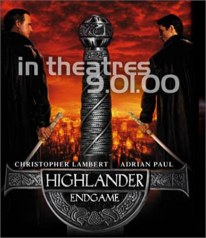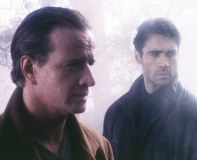| Highlander: Endgame |
| |
 |
USA, 2000. Rated R. 87 minutes.
Cast: Christopher Lambert, Adrian Paul, Bruce Payne, Lisa Barbuscia,
Donnie Yen, Adam Copeland (as "Edge"), Ian Paul Cassidy, Jim Byrnes, Peter
Wingfield, Damon Dash, Beatie Edney
Writers: Story by Eric Bernt, Gillian Horvath, and Bill Panzer;
screenplay by Joel Soisson; characters created by Gregory Widen
Music: Nick Glennie-Smith, Stephen Graziano
Cinematography: Douglas Milsome
Producers: Peter S. Davis, William N. Panzer
Director: Douglas Aarniokoski
LINKS
|
 movie
that requires intimate knowledge of the Highlander franchise to digest its half-baked
story, Highlander: Endgame is the fourth sequel to a film designed to
stand alone. In 1986, Highlander established the premise of a small group
of Immortals living among us, battling each other across the centuries to become
the last survivor of the species and thus earn a "Prize" that makes him all-powerful.
Highlander's tagline: "In the end, there can be only one."
movie
that requires intimate knowledge of the Highlander franchise to digest its half-baked
story, Highlander: Endgame is the fourth sequel to a film designed to
stand alone. In 1986, Highlander established the premise of a small group
of Immortals living among us, battling each other across the centuries to become
the last survivor of the species and thus earn a "Prize" that makes him all-powerful.
Highlander's tagline: "In the end, there can be only one."
Highlander (rating: B) didn't make waves in U.S. movie theaters,
but became a huge transatlantic cult hit on video. Driven by Russell Mulcahy's
stylish music-video direction and Queen's energetic soundtrack, Highlander
also boasted a stellar supporting turn from Sean Connery. Connery would win
an Oscar™ the following year for playing essentially the same wise-but-tough
mentor in The Untouchables and recycle the character in a dozen subsequent
films, but because Highlander came before all that, Connery's performance
was memorable, not stale. Similarly, Highlander was released before the
music video style became commonplace in feature films and before Christopher
Lambert (who portrayed title character Conor MacLeod) became a joke in the United
States. Though not a dynamic actor, Lambert made a sufficiently dark and brooding
hero who oozed bestubbled, glowering sex appeal.
Highlander's success eventually made a sequel inevitable, but the creators
had to struggle with a problem: the conclusion of Highlander precluded
the possibility of continuing the story. Remember, the concept was that there
could be only one. They had a hero with no one to fight. Undeterred, Highlander
II (rating: D-) imported immortals from another planet and even brought
Connery back from the dead. The idea worked so poorly that Highlander 3
(rating: D+) proceeded as if the first attempt at a sequel had never been made,
and instead released three presumed-dead immortals from a cave where they had
been buried alive for centuries, raising the esoteric metaphysical question
of how one can earn a magical prize that requires the death of all other Immortals
and then have it revoked because not all of them were actually dead.
Highlander also begat a syndicated television series, which introduced
Conor's distant cousin Duncan MacLeod (Adrian Paul) and a wide array of unappealing
supporting characters. The writers didn't know what to do with the Highlander
concept. Highlander the Series was simply pedestrian one-hour confrontations
pitting Duncan MacLeod against one overacting nefarious Immortal after another,
each a pale imitation of Clancy Brown's delicious overarching villainy in the
first film. Originally a tiny group, the number of Immortals grew exponentially
to the point where it seemed that every other person walking down the street
was one. The writers eventually developed wider story possibilities by introducing
The Watchers (an organization of humans dedicated to observing Immortals without
interfering in their affairs), but it was too late to save the series.
Why this Highlander history lesson? Because instead of being a sequel
to the first three Highlander movies, Endgame is an extension
of the television series, on which Lambert guest-starred a once or twice. It
follows the same episodic format, meaning that there is not only one left at
the end, belying the promise of the title and leaving the door open for more
insipid installments. Fans of the original movie who never followed the series
will be disappointed. Even though Lambert gets top billing and equal screen
time, Paul's Duncan MacLeod is the real hero. Those who ignored the TV series
(and who didn't, really?) will also find bewildering the cameos by recurring
series characters, including Jim Byrnes as Dawson, a Watcher, and Peter Wingfield
as Methos, a 5000-year-old Immortal who has renounced violence. There are cameos
by characters from the original Highlander, too (Beatie Edney as Heather
and Sheila Gish as Rachel), but their scenes, like Lambert's, are all revisionist
history.
The movie itself is a disaster. The plot and the characters' motivations are
nonsense. Lambert's character has nowhere to go, and his once-magnetic glower
is tired and worn. Several opportunities for spectacular action are squandered
because the movie's villain (Bruce Payne) has a tendency to execute summarily
his own henchmen. Paul's modicum of charisma, director Douglas Aarniokoski's
broad panoramas that recall the original Highlander, and Lambert's amusing skirmishes
with a Scottish accent are not enough to provide any redeeming value. In the
end, there should have been only one.
Review
© October 2000 by AboutFilm.Com and the author.
Images © 2000 Dimension Films. All Rights
Reserved.


